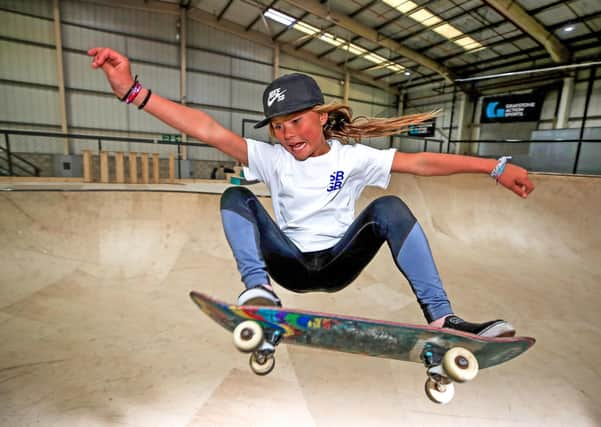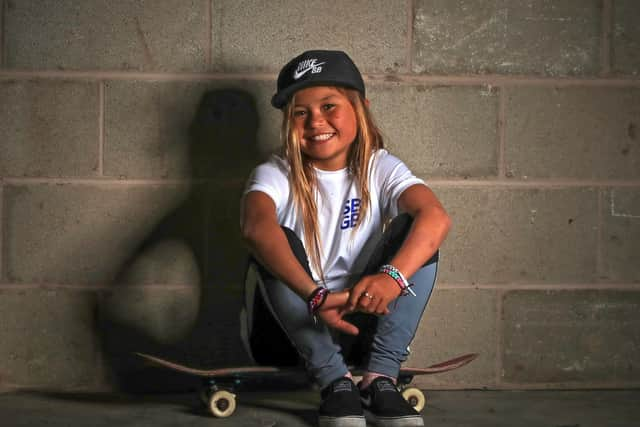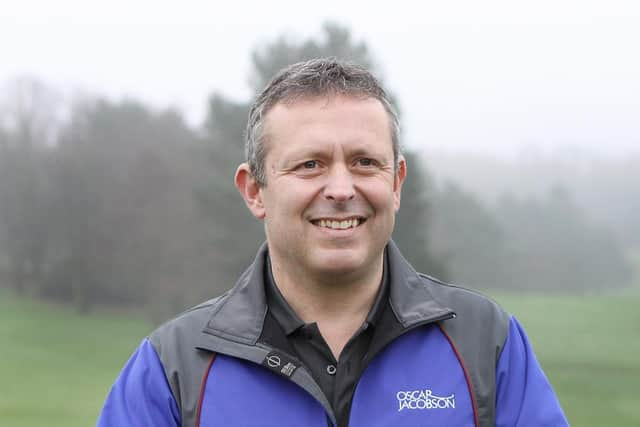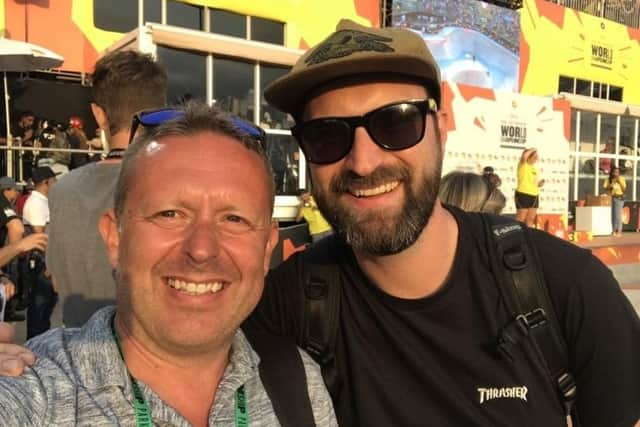Sky Brown and James Hope-Gill building the sport of skateboarding from scratch


It was August, 2016, two days before the start of the Rio Games, and while perhaps not a moment to shake the planet to its very core, it did at least cause the majority of people within the sporting world to let out a collective ‘eh?’.
Skateboarding is barely a sport, was the consensus, how can it be considered worthy of a place in the greatest sports show of all?
Advertisement
Hide AdAdvertisement
Hide AdFour years on, and even with a delayed Olympics due to the coronavirus, there is still an element of the unknown surrounding skateboarding, one of five sports introduced to the Tokyo programme, along with surfing and sport climbing.
Safe to say, the International Olympic Committee were attempting to engage a younger audience with the Tokyo Games, and skateboarding is a sport that opens that door.
Moves like the ‘180 heelflip’ and the ‘crooked grind’ may be alien concepts now, but the Olympic window could change all that and take skateboarding to a whole new audience.
In the United Kingdom, there are 750,000 skateboarders, 80 per cent are younger than 18 and while they may not know a Carl Lewis from a Nadia Comaneci, these are different times and skateboarding is hurtling towards prominence.
Advertisement
Hide AdAdvertisement
Hide AdAt the heart of it in this country, at the nose of the skateboard as they would say in the trade, is a sports administrator from Sheffield, trying to give a recreational pursuit that is more lifestyle than sport, a sense of organisation, a direction and a talent pathway.


James Hope-Gill will be a name familiar to footballers in South Yorkshire after his 20 years at the Sheffield and Hallamshire County FA, first as disciplinary secretary and then through the ranks to chief executive. Since 2014, he has been building a national framework as the first chief executive of Skateboarding GB.
It is turning out to be quite a challenge, but one he is relishing.
“When you look at skateboarding, it’s the fourth most watched sport on instagram. Kids these days don’t really watch TV, they consume their content from social media and skateboarding is a big part of that,” Hope-Gill tells The Yorkshire Post.
Advertisement
Hide AdAdvertisement
Hide Ad“That’s one of the reasons the IOC brought skateboarding into the Games – youth engagement. Then there’s also accessibility because it’s really cheap and you can skateboard anywhere; at home, at parks. And thirdly, you can create a legacy. But it’s that youth engagement and the power of social media that was certainly at the forefront of the IOC’s mind. It gives us a fantastic potential for growing and getting more people involved.”


Hope-Gill certainly has a unique challenge on his hands. Skateboarding is not like most Olympic sports where there is a competitive element at its heart. There are no clubs in skateboarding, nor regional teams. The only associations for boarders are with brands or independent shops.
“The vast majority of other sports have been created for the sake of sport,” says Hope-Gill, who was brought on board to set up Skateboard England in 2014, two years before it was accepted into the Olympics.
“Skateboarding, by contrast, has been used as a marketing tool because there hasn’t been the concept of competition.
Advertisement
Hide AdAdvertisement
Hide Ad“The vast majority of skateboarders don’t do it for competition, they do it because they see it as a lifestyle, wrapped up in culture and fashion.


“So skateboarding has developed via brands; the concept of teams competing against each other doesn’t exist. The concept of teams competing against each other for brands, say Nike for example, does exist. They go out to produce the content, they then use that to sell products, so it’s all about products and marketing.”
Hope-Gill manages a small team. Skateboard GB have three members of staff; himself, a team manager to take athletes to competitions across the world, and a digital manager.
“We knew that as an organisation coming into a community that already existed, what we had to do first was engage with skateboarders, which is why we’ve got someone on digital, to work with them and support them,” he says, “before we start doing what traditional governing bodies would do around facilities or workforce.”
Advertisement
Hide AdAdvertisement
Hide AdThey are funded by Sport England and UK Sport, but the money coming in is nominal. Last year, Skateboard GB held its first national championships. A second was due to take place last month but was postponed because of coronavirus.
“Sponsors expect a return on investment, but because we’re building something it’s hard to give that,” he admits.
“But the potential is huge, especially with an Olympics on the horizon, so we’re saying to sponsors, come on the journey with us and help us define that journey.”


One name that could become hugely popular during the Tokyo Olympics is Sky Brown, the 11-year-old who has already qualified to represent Britain at the next Games.
Advertisement
Hide AdAdvertisement
Hide AdHad the Games gone ahead as scheduled this summer, Brown would have been Britain’s youngest all-time Olympian. As it is, she will miss that mark by two weeks due to the rescheduling to next summer. Even so, think of what a 14-year-old Tom Daley in Beijing did for diving.
“She is a fantastic role model for girls and boys up and down the country, and anecdotally, the skate parks and skate shops are saying that girls are coming in and buying skate boards and learning how to skate because of Sky Brown, which is fantastic.
“There is a huge potential for girls; only 20 per cent of participants are female. The main reason being girls seem to be nervous and self-conscious when they first get on a skateboard. So skate parks have been putting on girls-only sessions and we have seen the number of girls absolutely fly.
“These are the things we’re looking at as we create the foundation so that when we become a fully funded sport, hopefully, we can start looking at girls of BAME groups and low social economic groups as well. The vast majority do come from that background.”
Advertisement
Hide AdAdvertisement
Hide AdBuilding a talent pathway is interwoven into this upsurge in participation. Skateboarding has already been accepted into the 2024 Games in Paris, and Britain want to accelerate the development of talent to gain ground on the United States, Brazil, Japan, Canada and France, leading nations in skateboarding because they have had governing bodies in place much longer.
“There’s never been a talent pathway,” explains Hope-Gill.
“What you’d get is kids skating at their local park, they’d be spotted by their independent skate shops who would give them equipment. Bigger brands would then come in and give them a bit of cash, so the talent has gone through brands with the aim of marketing those brands.
“And there’s never been coaching within skateboarding, instead of a top person it’s peer to peer.
“So what we’re doing as the governing body is saying right, what does coaching actually look like in skateboarding? How do we define it, and what is an appropriate programme?
Advertisement
Hide AdAdvertisement
Hide Ad“What we don’t want to do is come in as GB and say we’ve now arrived, we’re dealing with talent, because we need to be working with what’s already there.
“It’s a really exciting time for skateboarding. We’re building a framework that is relevant to skateboarding and doesn’t compromise the integrity of that, but also helps that then develop and become world class.”
The James Hope-Gill story...
James Hope-Gill’S career in sports administration owes much to his own opportunism.
“I was at Sheffield Univiersity and came up with this idea of approaching United and Wednesday to see if they would let me do some research into the opposition, distribution of supporters and how I could compare and contrast them,” he says.
Advertisement
Hide AdAdvertisement
Hide Ad“I ended up going to Bramall Lane and Hillsborough with mates carrying clipboards, asking season-ticket holders on the Kop all sorts of questions.
“I tried to flog the idea to the FA but they put me in touch with Geoff Thompson at Sheffield and Hallamshire FA.”
So began a 20-year association with the county FA. Hope-Gill had one lunch with Thompson and was taken under his wing.
Once Thompson moved onto greater commitments for the FA, UEFA and FIFA, Hope-Gill gradually assumed more responsibility.
Advertisement
Hide AdAdvertisement
Hide Ad“When I first arrived, there were five or six members of staff and we all just dealt with governance; disciplines, cup competitions etcetera. And I managed to be CEO at the right time. We started development, taking development staff on, we applied to the FA for funding and grew to about
20-22 members of staff.
“I look back with great fondness on that 20 years. I learnt absolutely loads and it was a real privilege to be involved in the change.”
Editor’s note: First and foremost - and rarely have I written down these words with more sincerity - I hope this finds you well.
Almost certainly you are here because you value the quality and the integrity of the journalism produced by The Yorkshire Post’s journalists - almost all of which live alongside you in Yorkshire, spending the wages they earn with Yorkshire businesses - who last year took this title to the industry watchdog’s Most Trusted Newspaper in Britain accolade.
Advertisement
Hide AdAdvertisement
Hide AdAnd that is why I must make an urgent request of you: as advertising revenue declines, your support becomes evermore crucial to the maintenance of the journalistic standards expected of The Yorkshire Post. If you can, safely, please buy a paper or take up a subscription. We want to continue to make you proud of Yorkshire’s National Newspaper but we are going to need your help.
Postal subscription copies can be ordered by calling 0330 4030066 or by emailing [email protected]. Vouchers, to be exchanged at retail sales outlets - our newsagents need you, too - can be subscribed to by contacting subscriptions on 0330 1235950 or by visiting www.localsubsplus.co.uk where you should select The Yorkshire Post from the list of titles available.
If you want to help right now, download our tablet app from the App / Play Stores. Every contribution you make helps to provide this county with the best regional journalism in the country.
Sincerely. Thank you. James Mitchinson, Editor
Comment Guidelines
National World encourages reader discussion on our stories. User feedback, insights and back-and-forth exchanges add a rich layer of context to reporting. Please review our Community Guidelines before commenting.